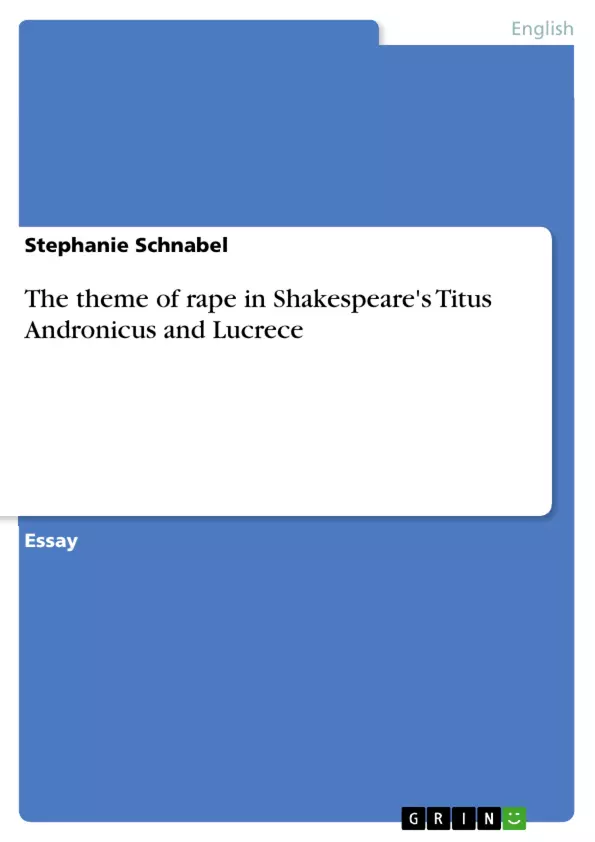Dieses Essay beschäftigt sich vor allen Dingen mit der Vergewaltigung der Lavinia in William Shakespeares "Titus Andronicus", um sich anschließend der der Lucretia in "The Rape of Lucrece" zuzuwenden. Welche Rolle spielt diese Gewalttat für die Beziehung der Figuren untereinander? Wie hat sich Lavinias Selbstverständnis verändert? Wie das Verhältnis zu ihrer Familie? Wie erlebt Lucretia die Vergewaltigung? Warum ihr Selbstmord?
This essay mainly deals with the rape of Lavinia in William Shakespeare's "Titus Andronicus" before considering shortly also the rape of Lucrece in the poem of the same name. Why is this crime so important for the interaction and relationships of the characters? How does Lavinia perceive herself before and after the rape? Does it affect the relationship with her family? In which manner does Lucrece experience the rape? Why does she commit suicide?
Inhaltsverzeichnis (Table of Contents)
- Rape and its Consequences in Shakespeare's Plays
- A Historical and Societal Context
- The Rape of Lucrece
- The Rape of Lavinia
- The Aftermath of Rape
Zielsetzung und Themenschwerpunkte (Objectives and Key Themes)
This analysis investigates the portrayal of rape in two of Shakespeare's plays, Titus Andronicus and The Rape of Lucrece. The study explores the historical, societal, and emotional implications of rape within the context of Renaissance England, examining the complexities of victimhood, agency, and the social repercussions of such acts.
- The role of rape in shaping the narrative and character development of the plays
- The impact of rape on female characters and their agency within a patriarchal society
- The portrayal of violence and revenge in relation to rape
- The significance of language and communication in the aftermath of rape
- The influence of classical literature and mythology on Shakespeare's depiction of rape
Zusammenfassung der Kapitel (Chapter Summaries)
- Rape and its Consequences in Shakespeare's Plays: This chapter provides a historical context for the study, exploring the legal and societal attitudes towards rape in Renaissance England. The chapter also discusses the influence of Augustine's The City of God on the understanding of consent and the emotional trauma of victims.
- The Rape of Lucrece: This chapter delves into the narrative of The Rape of Lucrece, examining the motivations behind Tarquin's rape of Lucrece and the psychological impact of the event on her. The chapter also explores Lucrece's decision to commit suicide and the complexities of her agency in the aftermath of the rape.
- The Rape of Lavinia: This chapter focuses on the rape of Lavinia in Titus Andronicus, analyzing the motivations of her rapists, Demetrius and Chiron, and the brutal consequences of the assault. The chapter examines the silencing and mutilation of Lavinia and how these actions further disempower her.
- The Aftermath of Rape: This chapter investigates the ways in which the aftermath of rape is portrayed in both plays. The chapter explores the reactions of the families involved, the use of language and communication, and the attempts to cope with the trauma. The chapter also analyzes the lasting impact of rape on the characters' identities and their relationships with others.
Schlüsselwörter (Keywords)
This analysis explores the themes of rape, victimhood, agency, patriarchy, revenge, language, communication, and the impact of trauma in Shakespeare's Titus Andronicus and The Rape of Lucrece.
Frequently Asked Questions
How does Shakespeare portray rape in Titus Andronicus?
Shakespeare depicts the brutal rape and mutilation of Lavinia, focusing on the resulting loss of agency and the subsequent cycle of revenge.
What is the significance of Lucrece's suicide?
In "The Rape of Lucrece," her suicide is portrayed as a complex act of agency and honor within a patriarchal society that views her as "polluted" after the assault.
How did Renaissance society view consent?
The essay explores historical and legal contexts, including the influence of Augustine's "The City of God," which shaped the understanding of consent and trauma during that era.
What role does language play in the aftermath of the rape?
Language is central, especially for Lavinia, whose mutilation (loss of tongue) symbolizes the ultimate silencing of the victim and her struggle to communicate the crime.
How does rape affect the relationships between characters?
Rape acts as a catalyst for political upheaval and family vengeance, fundamentally altering the social standing and identities of everyone involved.
- Citar trabajo
- Stephanie Schnabel (Autor), 2005, The theme of rape in Shakespeare's Titus Andronicus and Lucrece, Múnich, GRIN Verlag, https://www.grin.com/document/70036



